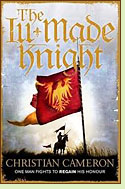The Ill-Made Knight
by Christian Cameron
Reviewed by Annis

Set on the killing fields of 14th-century France, The Ill-Made Knight brings the chanson de geste bang up to date with the knock-your-socks-off adventures of an orphaned London apprentice. Young Will Gold strives against the odds to fulfill his dream of becoming a preux chevalier, a celebrated knight of valour. But as English armies tear France apart in a scramble for riches and French peasants make easy prey for Europe’s dogs of war, what price chivalry? When the strong abandon the weak and kings are willingly forsworn, what price honour?
"You want the story of Poitiers, messires? Well, I was there, and no mistake." Recalling his coming of age in retrospect, Sir William Gold regales chronicler Jean Froissart with the story of his rise from lowly cook’s boy in the army of the “Black Prince” to knight of renown. A tumultuous, colourful and engrossing tale it is, too. The genial raconteur captivating us with lively anecdotes of love and war is no friendly, harmless old hound, though. Look closer: this veteran of countless brutal campaigns has the eyes of a wolf. "War is never what you expect it to be. Sometimes it is like theatre – like a passion play. Sometimes it is like the Black Plague – all death and horror. Sometimes it has an element of humour."
A veritable Who’s Who of the Hundred Years War, The Ill-Made Knight showcases Cameron’s specialty: world-building and characterization on a grand scale without sacrificing pace or human interest. Through William we experience first-hand the carnage of the Battle of Poitiers, the depredations of routiers, the bloody revolt of the Jacquerie and the growth of the great mercenary companies. Although his path to knighthood takes many twists and turns, Will Gold never lets go of his dream. His youthful naivety is soon lost, but the chivalric ideal remains his greatest weapon in a battle he won’t concede: to keep his soul intact in a place made hell on earth. (2013, 480 pages)
More about The Ill-Made Knight at Powell's Books, Amazon.comOther novels about war and chivalry:
1356 by Bernard Cornwell (2013), about an English archer who fights in the Battle of Poitiers; #4 in the Grail Quest series. More info
The White Company by Arthur Conan Doyle (1891), about a naïve young man who joins one of the great mercenary companies during the Hundred Years' War. More info
The Once and Future King by T.H. White (1940), a retelling of the Arthurian legends which includes as "Book 3" The Ill-Made Knight, about Sir Lancelot's struggle to attain the chivalric ideal in an imperfect world. More info
Nonfiction about chivalry and the Hundred Years' War:
Chivalry and Violence in Medieval Europe by Richard W. Kaeuper (2001). More info
The Hundred Years War: The English in France 1337-1453 by Desmond Seward (1999). More info
Chronicles by Jean Froissart (14th century), the definitive contemporary record of fourteenth-century England and France, covering the age of Anglo-French rivalry from the deposition of Edward II to the downfall of Richard II. More info
Online:
Knights Code of Chivalry at the Middle Ages website
Back to Medieval: Fourteenth and Fifteenth Centuries
Back to Directory of Book Reviews